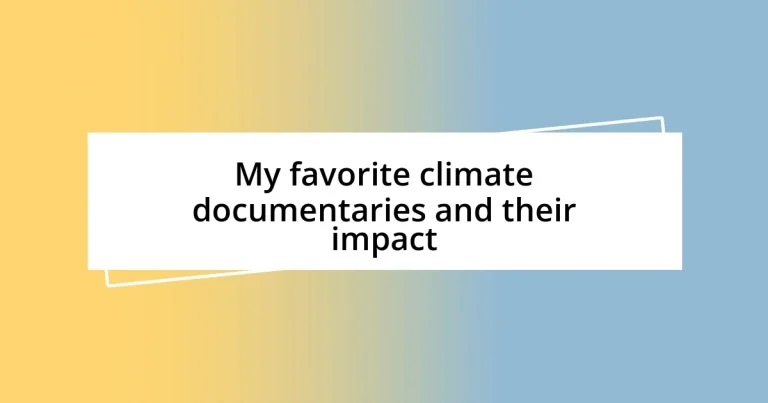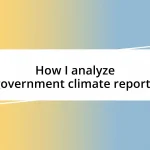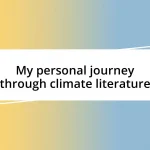Key takeaways:
- Climate documentaries like “Our Planet,” “Before the Flood,” and “Chasing Ice” evoke strong emotional responses, inspiring viewers to advocate for environmental action.
- These films effectively raise public awareness and shift perceptions, fostering dialogue that can lead to collective community initiatives and policy discussions.
- Key themes in climate documentaries include urgency for action, the beauty of nature contrasted with its destruction, and the hope provided by grassroots movements for change.
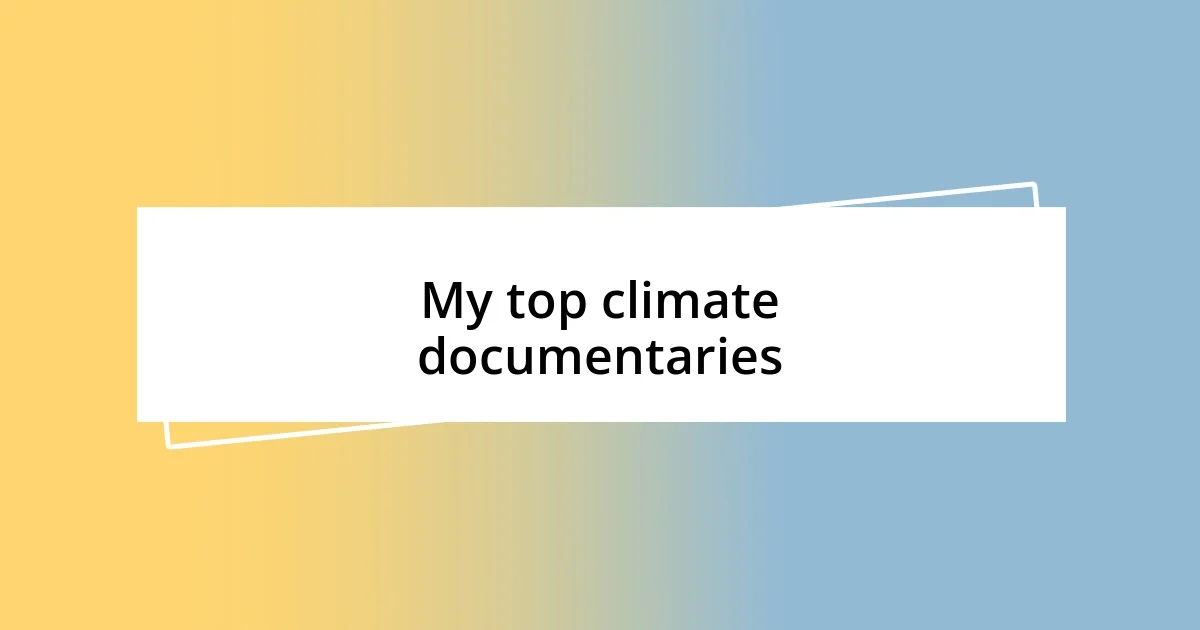
My top climate documentaries
One of my all-time favorites is “Our Planet,” narrated by the soothing voice of David Attenborough. This documentary struck a chord with me; the breathtaking visuals combined with a poignant message about the fragility of our ecosystems left me feeling both inspired and heartbroken. Can you imagine witnessing the beauty of our Earth while being reminded of the severe threats it faces? It really puts things into perspective.
Another documentary that I can’t stop thinking about is “Before the Flood.” Leonardo DiCaprio takes viewers on a global journey, meeting with scientists and activists. What resonated with me most was the urgency of the message—how can we afford to ignore the signs anymore? I remember watching it late at night, feeling a mix of hope and despair, realizing how interconnected our actions are and that change starts with us.
Lastly, “Chasing Ice” is a film that I found particularly moving. It follows photographer James Balog as he documents the shrinking glaciers. I remember being captivated by the stark images of melting ice—seeing tangible evidence of climate change was a wake-up call for me. How can we turn our backs on something so tangible and beautiful? This documentary not only made me appreciate the planet more, but it also ignited a passion within me to advocate for climate action.
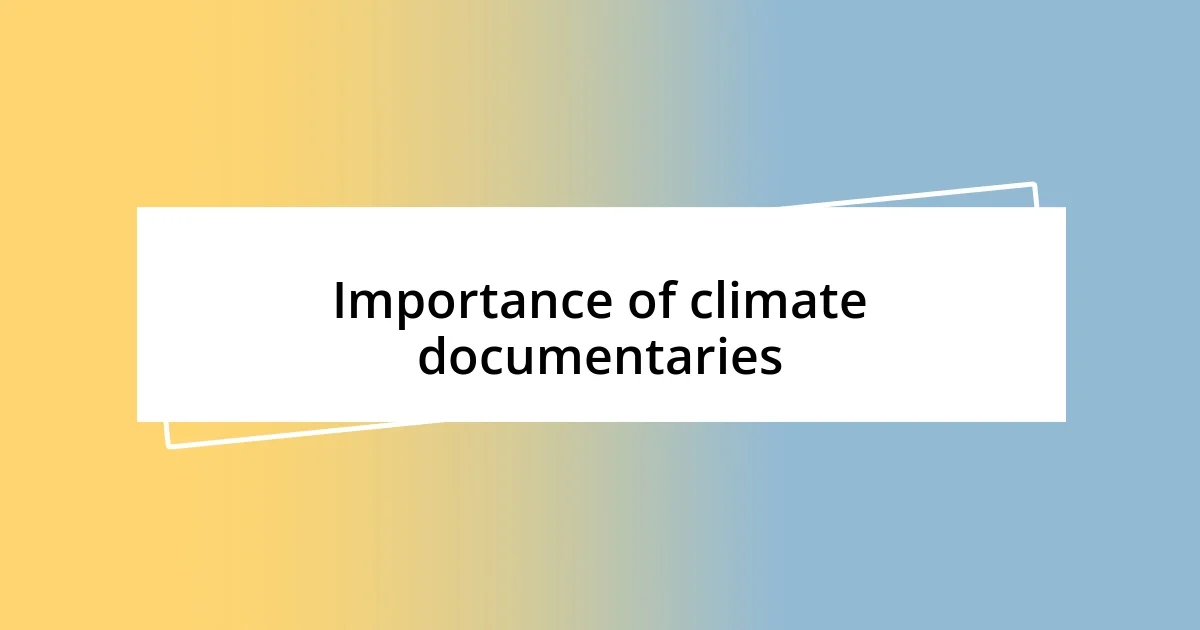
Importance of climate documentaries
Documentaries play a crucial role in shaping public awareness about climate change. For me, watching these films often sparks a deep emotional response that words alone can’t convey. They not only inform but also engage viewers on a personal level, compelling us to reflect on our choices and their impact on the planet.
- They broaden our understanding of complex environmental issues.
- Documentaries can change perceptions, making the abstract tangible through storytelling.
- They inspire action by showcasing success stories from individuals and communities.
I find it fascinating how a single documentary can ignite a passion within someone who might not have considered the environment otherwise. After watching one impactful film, I felt compelled to engage in local clean-ups and advocate for sustainable practices in my daily life. It’s amazing what a blend of visual storytelling and emotional resonance can do to galvanize communities and create real-world change.
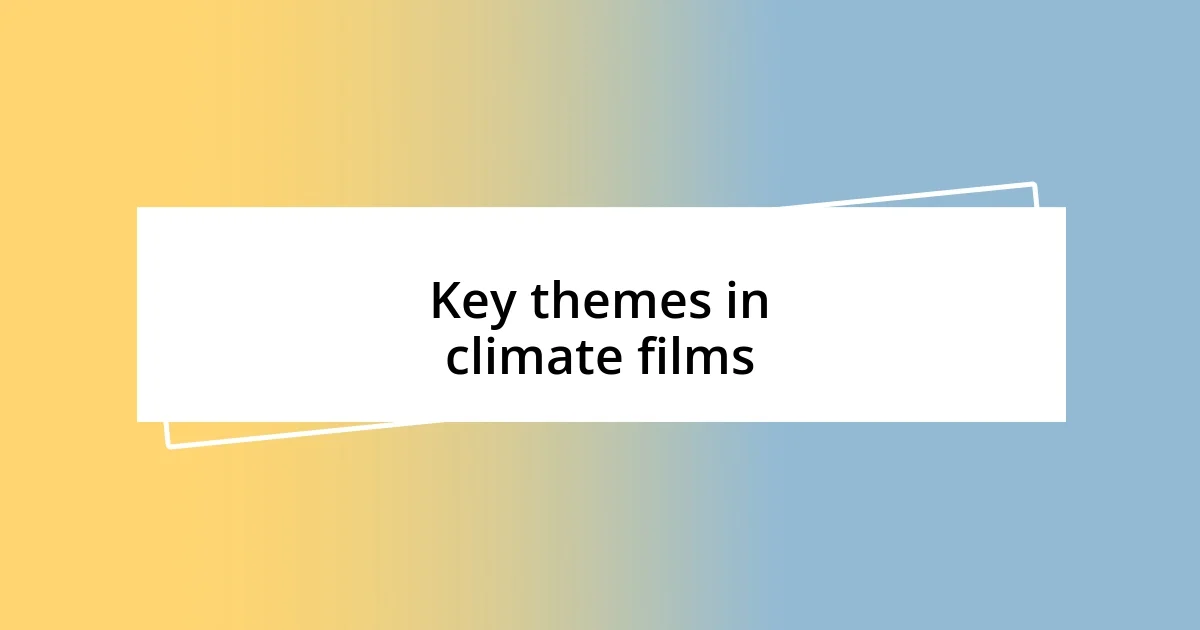
Key themes in climate films
The key themes in climate films often revolve around urgency and connection. I’ve noticed that many documentaries highlight the immediate need for action, which always strikes a chord with me. By showcasing not just the problems but also the human stories behind them, these films can evoke a sense of empathy and responsibility. Have you ever felt that pit in your stomach when you see a family losing their home to rising sea levels? It’s a powerful reminder that these are not just statistics; they’re real people facing real challenges.
Another prevalent theme is the beauty of nature and the stark contrast of its destruction. In documentaries like “Chasing Ice,” the stunning visuals of glaciers can honestly take your breath away, yet seeing them melt away serves as a haunting reminder of the consequences of climate inaction. When I watch such footage, I’m filled with a deep sadness, but also inspiration—it’s a call to preserve what remains. Nature’s beauty deserves to be protected, and these films drive that message home effectively.
Lastly, the notion of hope and resilience commonly threads through climate documentaries. They often spotlight individuals and communities making a difference, reminding me that positive change is possible. I recall watching a film where a local group transformed a barren area into a thriving garden. It fueled my belief that even small actions can lead to significant impacts. These stories show us that while the challenges are daunting, we are capable of creating solutions together.
| Key Theme | Example |
|---|---|
| Urgency | “Before the Flood” emphasizes immediate action against climate change through personal stories. |
| Beauty vs. Destruction | “Chasing Ice” illustrates the stunning nature before and after climate impact, evoking strong emotions. |
| Hope and Resilience | Documentaries often highlight grassroots movements showing that change is achievable with collective effort. |
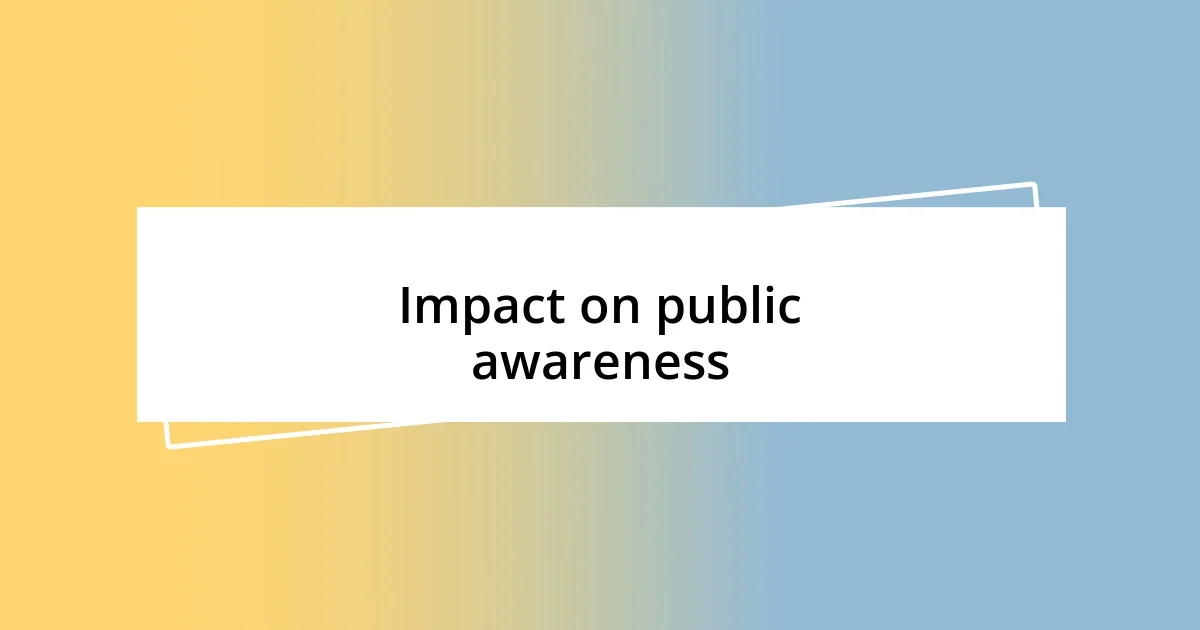
Impact on public awareness
Watching climate documentaries has a profound impact on public awareness, sparking conversations that often extend beyond the screen. I remember after viewing “Before the Flood,” I found myself discussing the issues with friends who had never considered climate change’s breadth. These films don’t just provide information; they create a community dialogue that can lead to collective action.
Their influence can shift mindsets and make what seems distant feel immediate. When I saw “Chasing Ice,” I was moved not just by the visuals, but by the shared devastation of what could be lost. It’s a chilling thought, isn’t it? The idea that people can witness the melting of glaciers and still feel untouched might seem unfathomable, yet it’s a reality. Documentaries catalyze awareness, motivating discussions that can reach people who may feel disassociated from the issue.
As I’ve personally experienced, the storytelling in these films often lays bare emotional truths that resonate strongly with viewers. After participating in a screening of a documentary, I was struck by how many attendees expressed a newfound urgency to make a difference in their lifestyle choices. It’s almost like awakening a dormant sense of responsibility. If one film can shift a room full of minds towards action, imagine the potential of an entire genre dedicated to raising awareness about our planet’s plight.
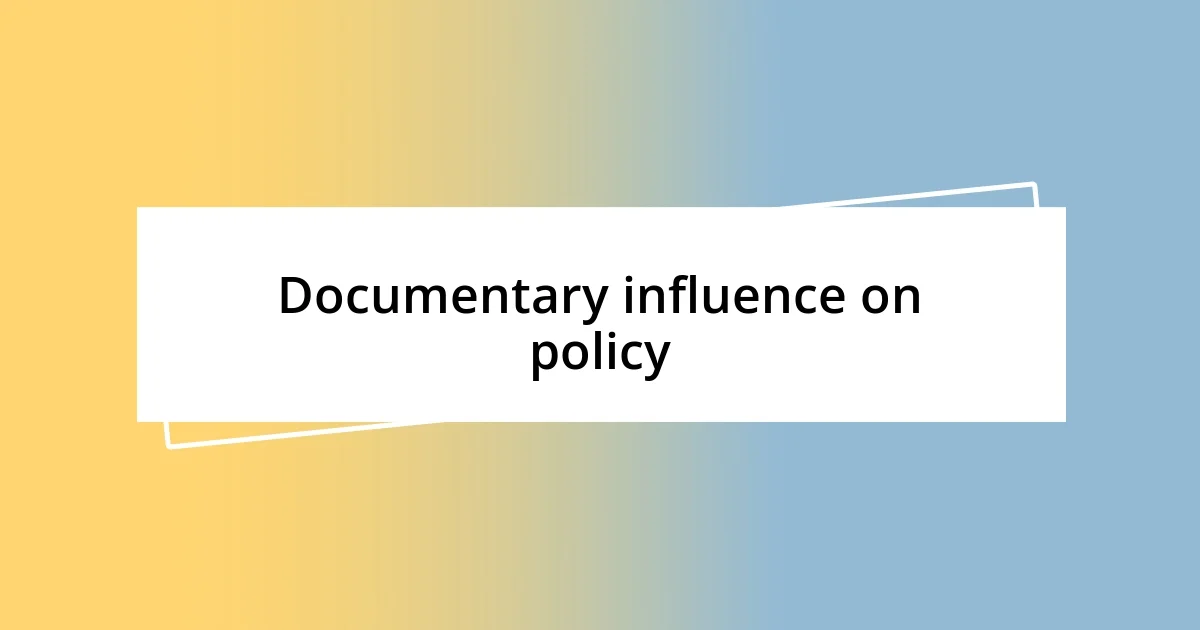
Documentary influence on policy
There’s something remarkable about how documentaries can shape policy discussions. After watching “The True Cost,” for instance, I found myself reflecting deeply on consumerism and its environmental toll. This engagement can spur not only individual changes but, more importantly, influence policymakers who’ve been moved by widespread public concern.
I remember attending a local town hall where the impacts of climate documentaries were palpable. Conversations were buzzing about initiating a community renewable energy project, ignited in part by the urgent call to action portrayed in films like “Our Planet.” It made me wonder: how many policies have been drafted or revised after a single screening that resonated with the audience? The power of these films to catalyze such discussions can’t be understated.
Moreover, these documentaries often highlight successful initiatives that serve as inspiration for legislation. For example, seeing the effects of community-led conservation efforts in “The Age of Stupid” pushed me to advocate for similar grassroots movements in my city. I couldn’t help but ask myself, how can we not take notice when real-life examples of success are presented so clearly? It’s this blending of emotional storytelling with actionable insights that creates a potent mix for influencing policy change.
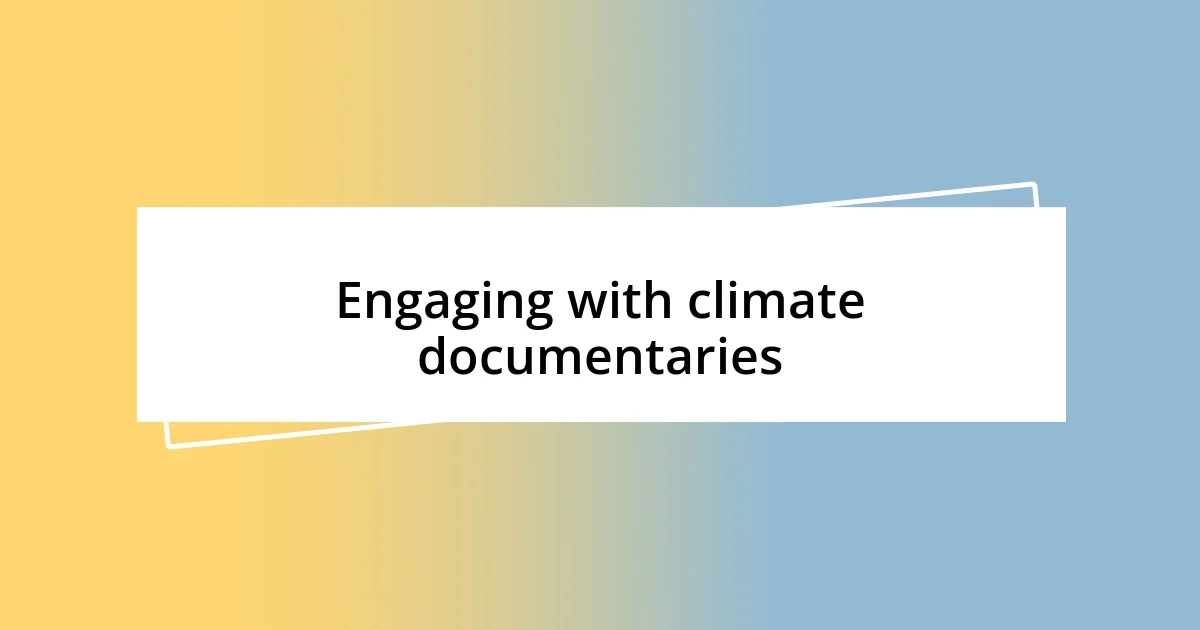
Engaging with climate documentaries
Engaging with climate documentaries can be an eye-opening experience that transcends mere entertainment. I recall watching “Our Planet” and feeling an overwhelming connection to the natural beauty showcased. It struck me how easy it is to take these wonders for granted. This realization fueled my desire to share those moments of awe with others, sparking conversations that lingered long after the credits rolled.
The emotional pull of these documentaries is akin to a gentle push towards action. For example, after viewing “Merchants of Doubt,” I felt compelled to dive into discussions about misinformation and its role in climate change denial. I wondered: how many people are unaware of the narratives being manipulated before our eyes? It’s fascinating to think about how one film can shift not just perspectives but also the very tone of conversations around us.
I’ve found that watching these films in a group amplifies their impact, creating a collective sense of urgency. After a screening of “Years of Living Dangerously,” my friends and I brainstormed local initiatives, from beach clean-ups to educational workshops. Reflecting on that night, I can’t help but ponder: how often do we stumble upon moments that ignite our passion to protect the planet? Each documentary serves not just as a source of information but as a rallying point for community involvement and individual action.












